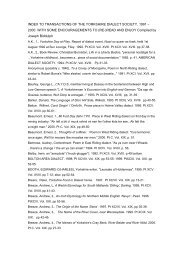Download a PDF version of this page - Yorkshire Dialect Society
Download a PDF version of this page - Yorkshire Dialect Society
Download a PDF version of this page - Yorkshire Dialect Society
Create successful ePaper yourself
Turn your PDF publications into a flip-book with our unique Google optimized e-Paper software.
A Simple Word-Recognition ExperimentThe following dialect words are known to be in contemporary use in parts <strong>of</strong><strong>Yorkshire</strong>, but they may not all feature in your particular area. It might beinteresting to present them (or a selection) to your class in order to see whatthey recognise. DO NOT GIVE THE DEFINITIONS AT FIRST ... fnd out if the childrenunderstand them or use them at home, or know other people, such as relatives,who do.They may be familiar with some <strong>of</strong> them without necessarily knowing what theymean. Alternatively, they may give different (but equally valid) defnitions. Youmay have children in your class who have moved into the area from other parts <strong>of</strong>the county (or country!). Explore the differences and similarities ... but alwaysstress that no accent or dialect is in any way superior or inferior to any other.Ask them if they know any other local words not in the list. Look them up in adialect dictionary.Addle: (verb) to earn. Old English via CM Norse’Appen: perhaps (happen)Attercop: (noun) spider. Old English "poisonous spider” cf AdderBaht: (Adjective/ preposition) without. As in "On Ilkla Moor baht P’Pat". OldEnglishBackend / Backendish: (noun / adjective) Autumn / Autumnal....self-explanatory!Blain / Blen: (noun) sore, swelling or boil. Old EnglishCat Hawed: (adjective) drunk - pronounced "cattored"Creel: (noun) bench for killing pigs. One <strong>of</strong> the very few Celtic words still used in<strong>Yorkshire</strong>Copyright <strong>Yorkshire</strong> <strong>Dialect</strong> <strong>Society</strong> 2010
Kelter / Kelterment: (noun) Junk, rubbish, litterLap: (verb) to cover or wrap upLaik: (verb) to play, or laze around. Old NorseLowance: (noun) a packed lunch; from "allowance”Lug: (noun) earMafted: (verb) to feel very hot or breathless – “Ahm reet mafted!”Mash: (verb) to brew, as in teaNesh: (adjective) weak, feeble. Feels the cold. Old EnglishNithered: (verb) to shiver with cold. Old NorseNowt: (noun) nothing. Rhymes with "stout" or "coat", Literally NaughtOvver / Ower: (preposition or intensifer) over. Rhymes with "hower", "hour” or"sower"Owt: (noun) anything. Rhymes with "stout". Literally Aught. NB “Owt or nowt?"Anything or nothing?Piking <strong>of</strong>f: (verb) to leave without paying. Probably related to turnpike. A pikeyspent a lot <strong>of</strong> time on the road. A tramp etcPutten: past tense <strong>of</strong> the verb to put. Cf gotten - associated with AmericanEnglish but surviving jn parts <strong>of</strong> <strong>Yorkshire</strong> from original standard usagePuther: (verb) to make clouds <strong>of</strong> smoke or dust, eg "Yoon's putherin’ toneet!” Theoven's smoking tonight!Rick / Rigg: (noun) haystack, back or ridge. Almost any ridge-like featureRigwelted: (verb) on its back and unable to move (<strong>of</strong> an animal)Rive: (verb) to tear or rip outSile / siling: (vert)) to rain heavilySkell: (verb) To tip or spill. Old Norse. A sower skells the seedSkeltered: (adjective) crookedSlape: (adjective) slipperySock: (noun) a ploughshare. Another very rare Celtic survival ... possiblyCopyright <strong>Yorkshire</strong> <strong>Dialect</strong> <strong>Society</strong> 2010
eintroduced via Cumbria by Vikings who had previously settled in IrelandTagareen: (noun) junk, rope, marine stones, bits and pieces etc. A coastal term,thought to be <strong>of</strong> Irish or even Midle Eastern origin, but seemingly limited to<strong>Yorkshire</strong> and NorthumberlandTheak: (verb) to thatch - hence surname Theaker. Old NorseThoil / Thole: (verb) to tolerate, put up with, stand or bear. Old EnglishThrang / Throng: (Adjective) crowded, busy’Ug: (verb) from "hug". Always used to mean lift or carry, not to embrace in thestandard senseUrchin: (noun) hedgehogVarmint: (noun) vermin. Old form surviving in America and <strong>Yorkshire</strong>Wick: (noun / adjective) small insect, especially a lively one. Relates to quick-originally meaning alive. EgHAs wick as a lop." - "As lively as a fea". Old EnglishYam: (noun) homeYat: (noun) gateYatstead: (noun) Threshold - ie the space covered by the swing <strong>of</strong> an opening yatYoon: (noun) ovenCopyright <strong>Yorkshire</strong> <strong>Dialect</strong> <strong>Society</strong> 2010





